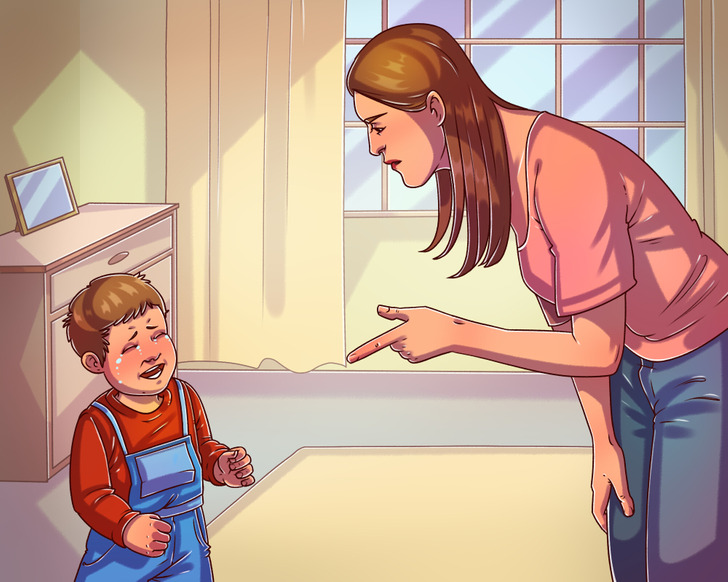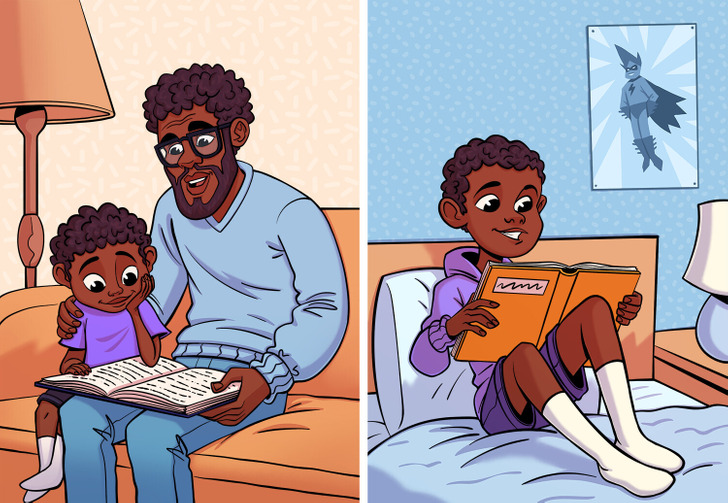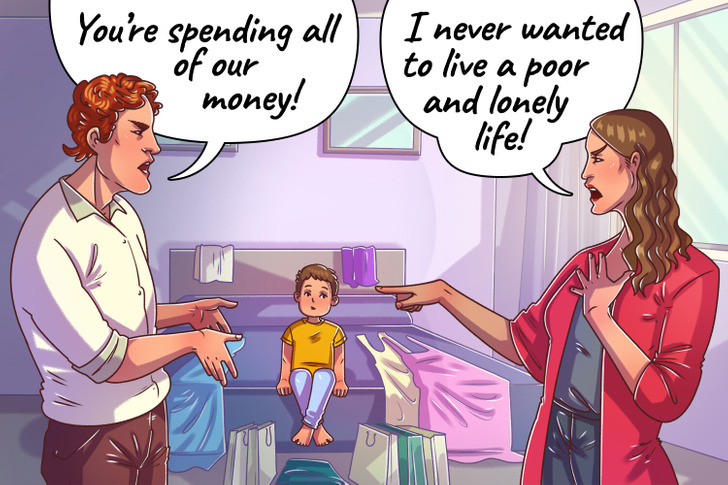Fearing for their children’s futures, parents search for universal parenting techniques that will put their kids on the route to a prosperous job and a happy life. But times are changing, and the old principles of success are no longer relevant. Sometimes, parents’ actions, intended to be helpful, can actually create challenges for their children’s future.
1. Not allowing their kid to fail

Perfectionist parent often strives for perfection themselves, leading them to expect increasing levels of perfection from their child as they grow older — from the child’s artwork never being good enough to their bed not being made perfectly or not studying hard enough. The child faces constant criticism and reprimands but is never allowed to learn from their mistakes. Children of perfectionist parents may grow up to be perfectionists themselves or develop low self-esteem and lack confidence. Both outcomes can negatively impact their future careers.
- Anna’s mother always compared her to Mary, saying, “Look how tidy Mary is compared to you, Anna!” Despite Anna’s efforts to emulate Mary, she never measured up, and her mother’s criticism only intensified. Anna’s mother never allowed her the chance to improve her habits and learn basic skills. Now at 25 years old, Anna still compares herself to others and always comes up short in her own eyes. Needless to say, this constant comparison has taken a toll on her self-esteem.
2. Paying a child for good grades

This topic remains a subject of debate, but consider this perspective: imagine yourself as a contractor continually paying more for a product or service, with the child as the supplier providing it in exchange for money or rewards. It doesn’t sound like a good idea, does it?
- Alexandra’s parents sought to motivate their daughter to excel in her studies by offering money as an incentive. Initially, Alexandra’s grades improved, suggesting the approach was effective. However, her parents later discovered that she had been fabricating stories about an imaginary illness and sharing them with her teachers. She even falsely claimed that her parents constantly criticized her for poor grades. The sympathetic teacher then raised Alexandra’s grades out of pity. Following this incident, Alexandra’s parents discontinued the practice of paying for grades and sought guidance from a child psychologist.
3. Preventing their child from expressing their feelings

Sometimes, adults dismiss a child’s feelings as wrong — insisting that bruises don’t hurt, feeling anger toward a child who hit them is shameful, or being sad even with a valid reason is incorrect. Parents often do this with good intentions, wanting to teach their children proper behavior. However, it’s crucial to recognize that a fundamental skill for modern individuals is the ability to acknowledge and manage their feelings, emotions, and needs.
- Kate, now 37, vividly remembers how her mother forced her to give away her beloved doll to another girl, admonishing her for being “greedy” and scolding her for getting upset over a “stupid toy.” Kate never got her doll back. Over the years, she has worked hard to assert herself, learning to say “no” to demanding people, including her boss and coworkers. Despite this, Kate often feels guilty whenever she refuses to comply with their requests.
4. Failing to support their child in front of strangers

Every child needs the assurance that their parents will stand up for them in any conflict, regardless of the situation, and won’t blindly trust the words of authority figures like teachers, principals, or neighbors. When parents allow their children to speak up for themselves when they are ready to take responsibility for their actions, it helps them develop healthy self-esteem and a sense of personal accountability.
- Maggy was raised by her grandmother, who often said, “But what will other people think?” Although her grandmother loved Maggy and wanted the best for her, she constantly emphasized the importance of public opinion. As a result, Maggy struggles to make her own decisions and even relies on her friends’ opinions when choosing something as simple as dessert.
5. Drawing inspiration and comparing to successful people

Each generation has its own set of heroes whom young people aspire to emulate. In recent decades, the tales of personal success from wealthy and influential individuals have become widespread. However, it’s not as simple as learning their life story and achieving happiness. If it were that easy, everyone who reads their books would have solved all their financial problems by now.
- Alex developed a passion for computers from a young age. Inspired by the story of Steve Jobs that his dad shared with him, Alex immersed himself in learning everything about Apple. When it came time to choose a university, Alex initially believed he didn’t need higher education because Steve Jobs succeeded without it. Eventually, Alex realized the importance of education for his path and pursued college to advance his career. Now, Alex jokes, “What worked for Steve Jobs is just a waste of time for an ordinary guy like me.”
6. Pressuring their child to decide on their future career

The notion that a person should stick to one career for their entire life is likely outdated and impractical. Many modern occupations didn’t exist a decade ago, while others have already become obsolete.
- Since childhood, Max had a passion for exploring computers and understanding various software programs. Despite his parents’ concerns, he pursued this interest and eventually discovered online courses in software testing. Now, he is thriving in this field, leveraging his potential and skills.
- Laura, at 37, worked as a sociologist for a major consulting firm but found it challenging to maintain her career after having her son. During maternity leave, she rediscovered her love for photography. Starting with unique photos of her child, Laura progressed to offering photoshoots for friends’ and acquaintances’ kids. Over time, she opened her photo studio. Laura now earns as much as her husband and successfully manages her professional life while caring for her family. This shift exemplifies the evolving nature of careers and the importance of embracing new opportunities.
7. Arguing about money

Since children may absorb long-lasting messages from these circumstances, it’s crucial to avoid arguing about money or other matters in front of them. Instead of one-on-one conflicts, which can cause youngsters to take sides and become distressed, talks should be led in a way that promotes involvement.
- Chris grew up witnessing his parents argue about money. When he went to college at 17 and moved away, he struggled with managing his finances and spending on unnecessary items. He now fears starting relationships, believing that money is the root cause of his sadness.
8. Prohibiting the child from using social networks

Social networks have become today’s equivalent of the yards and neighborhoods where we used to play as children. Kids can learn valuable skills through computer programs integrated with social media platforms. While parents should remind their kids about online safety rules, depriving children of this experience can be harsh.
- Aria’s mother was surprised to discover that her 10-year-old daughter had learned to create cool videos. Even more surprising was the realization that Aria had learned this skill from using TikTok. Now, creating short videos has become a family hobby for them.
9. Teaching the kid that they have the stuff at home

Many of us recall times when we asked our parents to buy us things, only to hear, “We already have that at home; we don’t need it.” Some parents repeatedly expose their children to such situations, unintentionally discouraging them from getting what they truly need. This pattern can significantly impact their financial habits as adults. On the other hand, constantly satisfying a child’s every need can also have negative effects.
- Jan’s mother often tells him they have things at home and they don’t buy them from the store. Jan has learned to overlook his needs, and with each subsequent request, he withdraws more, knowing not to ask. When Jan grows up and earns his income, money will go towards trivial things because that’s how he’s learned to live.
10. Preventing children from getting into conflicts

The ability to engage with others is perhaps one of the most crucial professional skills one can possess. It’s important not only to help children make friends but also to teach them how to engage in healthy arguments. People often hold differing opinions, and there are various ways to express emotions. The sooner children grasp this concept, the easier their interactions with others will be, including in professional settings.
- Michaela spent her life avoiding conflicts, preferring to agree with others rather than engage in disputes. She believed that someone always had to be the “smarter” one, but this approach proved more harmful than beneficial. One day, Michaela learned about active listening and decided to apply this approach in her professional life. She excelled at paying attention to others’ perspectives while also expressing her feelings when others attempted to take advantage of her. Initially, people found her communication style unconventional, but conflicts with coworkers became more constructive, leading to mutually beneficial resolutions.
11. Helping their child learn to save money

The world is always changing, and old ways of making or saving money might not work anymore. We can’t predict what skills will be valuable in the future economy. That’s why it’s important to teach kids to be flexible and ready for change, not just to save money.
- Emily’s grandfather saved money his whole life “just in case.” But when that “case” finally happened, a financial meltdown made all his investments lose value. Emily saw this while growing up, and now she’s worried the economy could collapse at any time. She believes the best investment is in her skills and knowledge.
12. Trying to build a strong character with the help of sports

While there’s a widespread belief that sports are beneficial for discipline and character development, excessive competitiveness in professional sports can be detrimental to a child’s physical and mental health. This competitiveness can be fueled by both fellow young athletes and coaches. Only a few individuals become champions, and coaches often prioritize these select few, neglecting the rest of the team. Coping with this unfair treatment at a young age can lead to low self-esteem and confusion about alternative life paths if a child must stop playing sports.
- Tom’s mother pursued rhythmic gymnastics as a child but had to abandon her Olympic dreams due to a leg injury. When Tom was three, his mother enrolled him in gymnastics classes, hoping he would excel. However, Tom struggled in this sport, leading him to lose interest in school, feel like a failure, and struggle to identify his strengths. Now, Tom is studying to become a child psychologist to help parents navigate the challenges of raising children without making the same mistakes.
Being protective of your children is natural, but it’s important to set boundaries. Respecting their privacy is crucial for a healthy parent-child relationship and their personal development. Violating their privacy can have serious negative effects, especially on their mental health.
Eye test

answer is 10



Leave a Reply